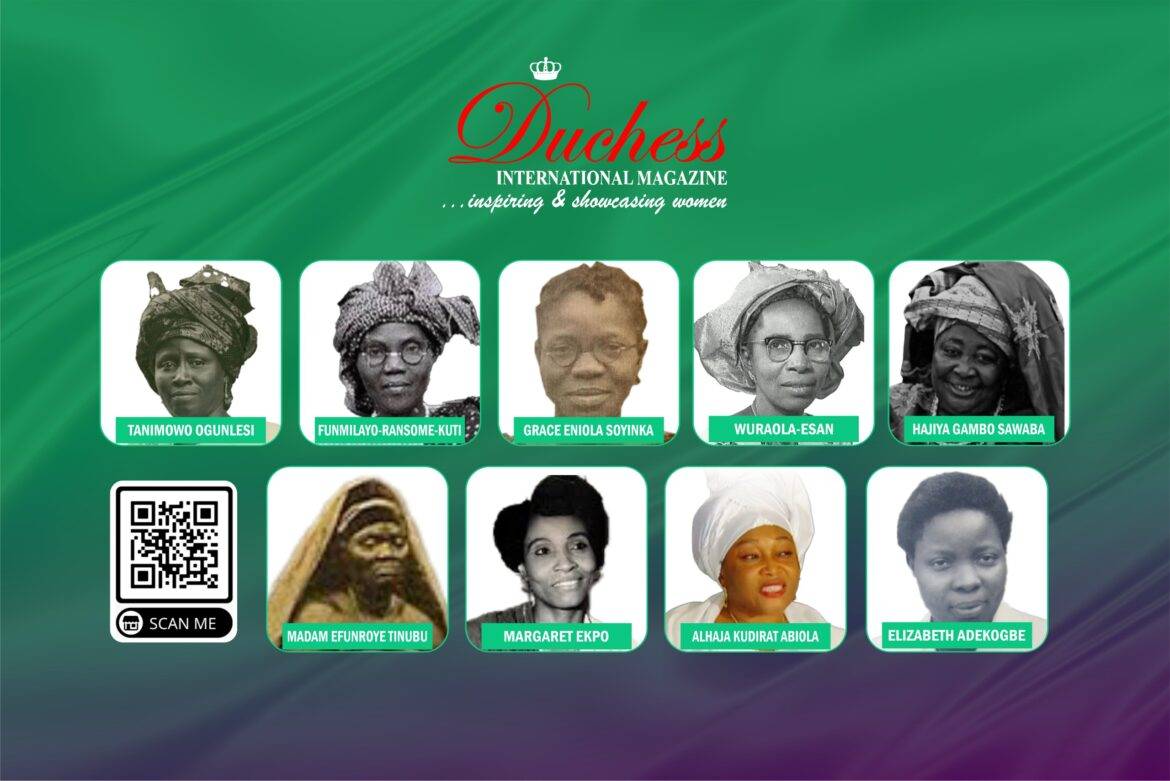As the nation marks its 64th year of independence, it is also appropriate to honor some of the brave heroes who relentlessly fought for our country’s freedom. Nationalists like Nnamdi Azikiwe, Ahmadu Bello, Obafemi Awolowo, Anthony Enahoro, Herbert Macaulay, and Tafawa Balewa are widely recognized for their roles in the independence struggle. However, there were women who equally fought for not only Nigeria’s sovereignty but also for women’s rights and liberation.
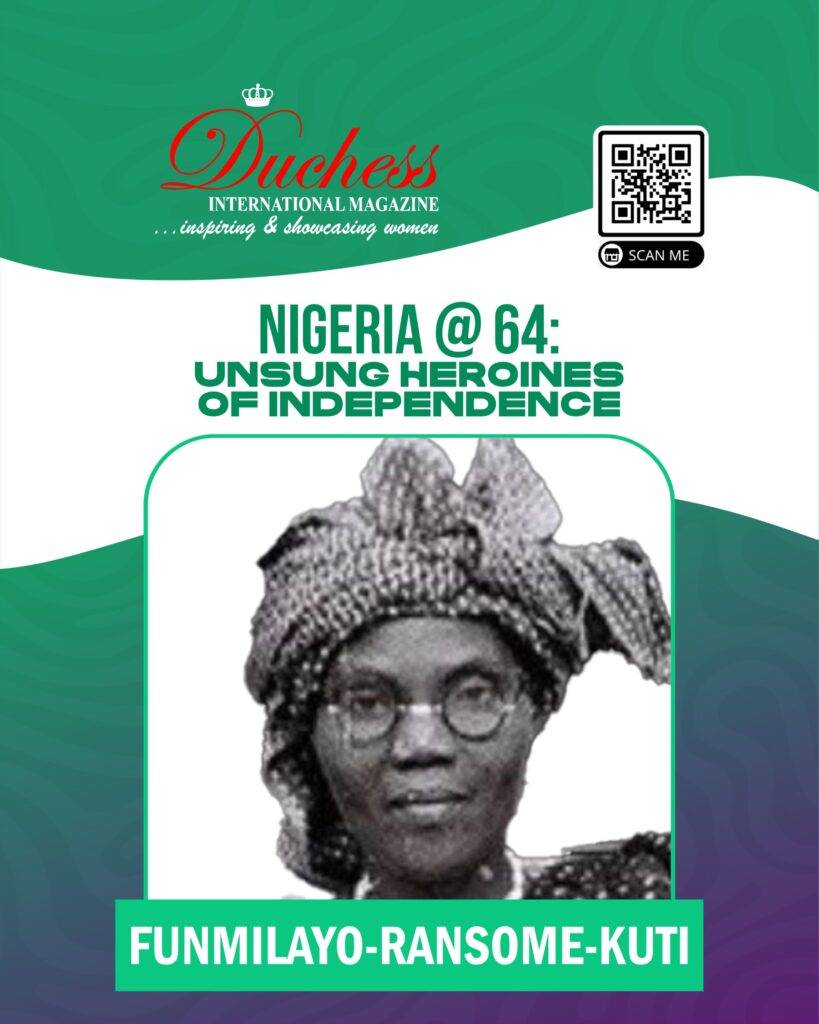
FUNMILAYO RANSOME KUTI
Funmilayo Ransome-Kuti, born in 1900 in Abeokuta, Ogun State, was an educator, politician, and a prominent women’s rights activist. Her fierce advocacy earned her the title ‘The Mother of Africa’. In 1932, she co-founded the Abeokuta Ladies Club (ALC), a charitable organization of educated Western women. The group later became the Abeokuta Women’s Union in 1946 and opened its doors to all women in Abeokuta, regardless of background. Known for standing strong against injustices toward women under colonial rule, Funmilayo also played an active role in Nigeria’s quest for independence, attending conferences and joining international delegations to discuss national constitutions. She was pivotal in the establishment of the Nigerian Women’s Union and the Federation of Nigerian Women Societies, advocating for women’s voting rights. In 1971, she received the Lenin Peace Prize and remained politically active until her passing in 1978.

MARGARET EKPO
Margaret Ekpo was a trailblazing female politician who played a key role in grassroots and nationalist politics before and after Nigeria’s independence. Known for advocating for the rights of marginalized women, especially in Nigeria’s eastern region, she joined the National Council of Nigeria and the Cameroons (NCNC) and was later appointed to the regional House of Chiefs in 1953. In 1950, she and Funmilayo Ransome-Kuti led protests over the killings at an Enugu coal mine. She founded the Aba Township Women’s Association in 1954, which she transformed into a powerful political force. In 1961, Margaret won a seat in the Eastern Regional House of Assembly, amplifying her voice in the fight for women’s rights. In 2001, the Calabar Airport was renamed Margaret Ekpo International Airport in her honor.
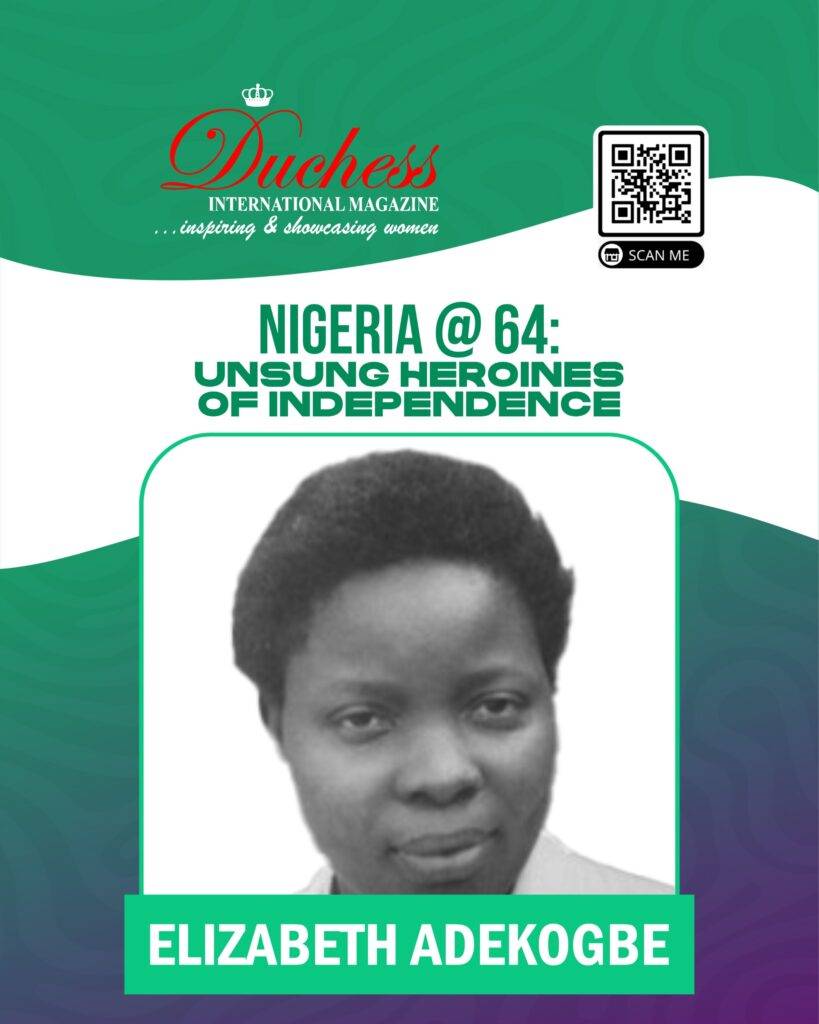
ELIZABETH ADEKOGBE
Elizabeth Adekogbe was a formidable politician, nationalist, and advocate for women’s rights. She led the Ibadan-based Women’s Movement of Nigeria, which in 1954 became the Nigerian Council of Women. This organization later merged with the Women’s Improvement League to form the National Council of Women Societies in 1959. Adekogbe was a vocal supporter of independence, tirelessly working for greater political representation for women and championing girls’ education.

WURAOLA ESAN
A colleague of Funmilayo Ransome-Kuti and Elizabeth Adekogbe, Wuraola Esan was another pioneering nationalist, politician, and women’s rights advocate. She was a passionate educator, founding the ‘Ibadan People’s Girls Grammar School’ in 1940. Esan also played active roles in the Nigerian Youth Movement and the National Council of Nigeria and Cameroons. She made history as the first female senator in Nigeria, representing Ibadan West, and was a founding member of the National Council of Women’s Societies.

HAJIYA GAMBO SAWABA
Hajiya Gambo Sawaba, born in 1933, was a powerful politician and activist in Northern Nigeria. At 17, she joined the Northern Element Progressive Union, which opposed both the Colonial Authorities and the Northern People’s Congress. Having suffered underage marriage herself, Sawaba became a staunch advocate against child marriage and forced labor. She championed women’s right to vote and receive an education, often landing her in prison—she was jailed 16 times. After her death in 2001, the New Nigerian paid tribute to her as “the most tortured and jailed Nigerian female politician.”

TANIMOWO OGUNLESI
As the first president of the National Council of Women’s Societies, Tanimowo Ogunlesi concentrated on women’s voting rights and education. She was a teacher, nationalist, and women’s rights advocate. In 1948, she founded Nigeria’s first indigenous boarding school, ‘The Children’s Home,’ in Ibadan. She actively participated in the struggle for independence and was the only woman on the 1953 Nigerian delegation to the UK to discuss the country’s independence.
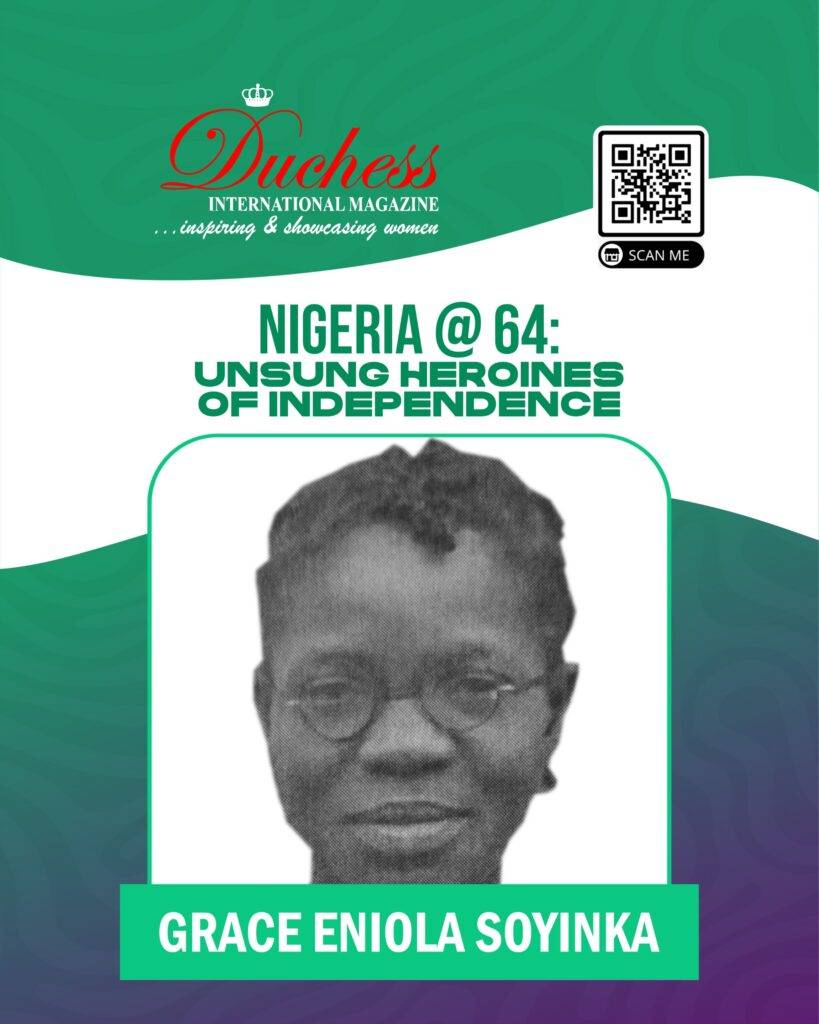
GRACE ENIOLA SOYINKA
Grace Eniola Soyinka, a shopkeeper, activist, and member of the aristocratic Ransome-Kuti family, co-founded the Abeokuta Women’s Union with her aunt-in-law, Funmilayo Ransome-Kuti. Together, they protested taxes imposed by the colonial-backed Alake of Abeokuta.
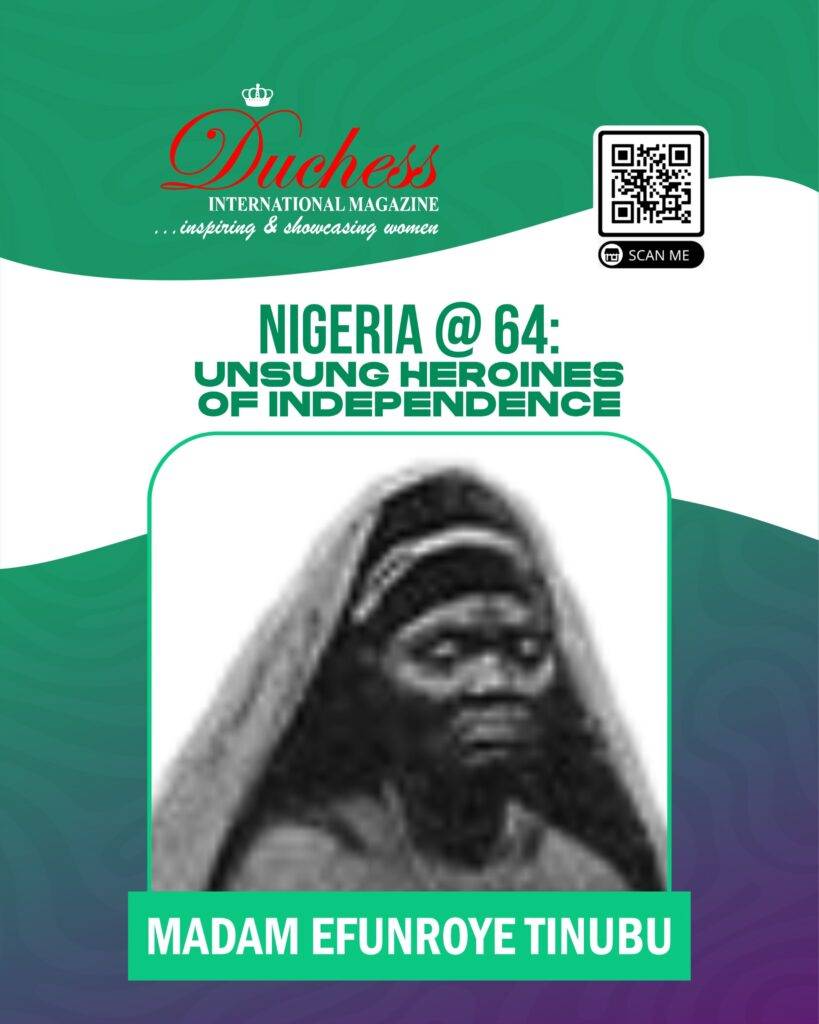
EFUNPOROYE OSUNTINUBU OLUMOSA
Efunporoye Tinubu, born around 1805 in Abeokuta, was a brilliant and influential businesswoman who held economic and political power in both Abeokuta and Lagos. Initially trading tree bark and leaves, she learned valuable business skills from her grandmother and mother. Tinubu’s influence was so great that when she defied British Consul Benjamin Campbell, he used military power to force her exile from Lagos. Though exiled, she remained a prominent trader until her death in 1887.
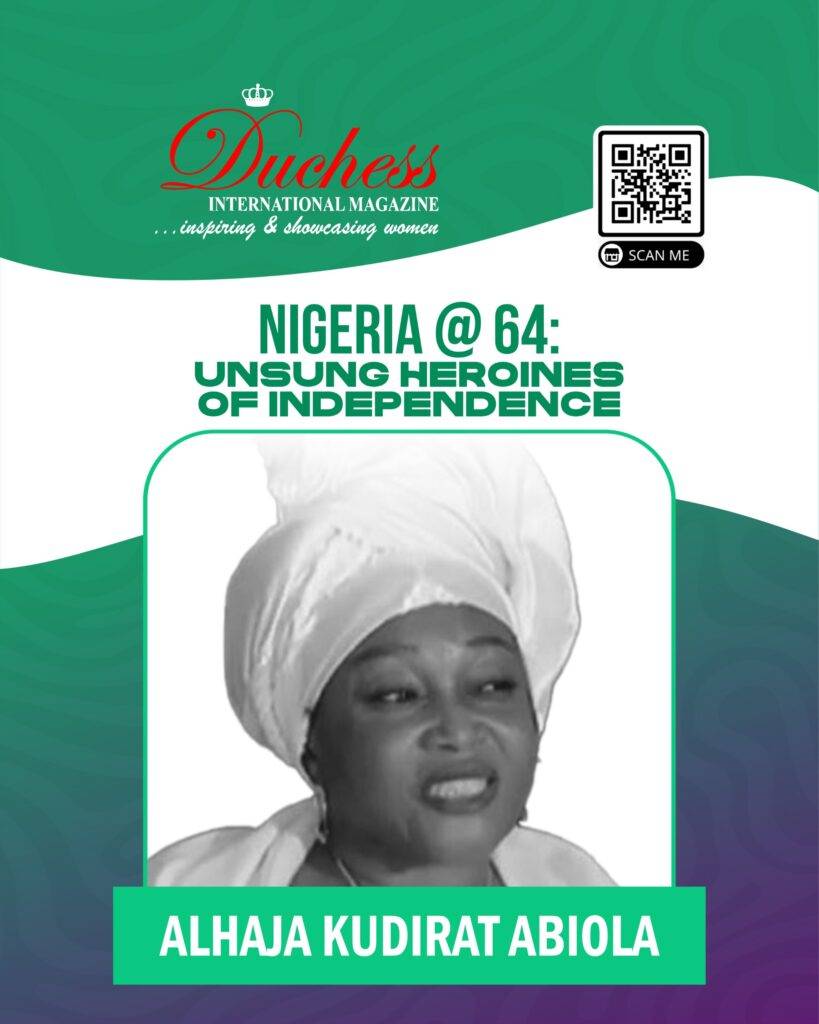
KUDIRAT ABIOLA
Kudirat Abiola, wife of Nigeria’s late President-elect Chief Moshood Abiola, was born in 1952 in Zaria. At 21, she married Abiola, with whom she had seven children. Kudirat championed various social causes, supporting educational programs for the Ansar-Ud-Deen Muslim movement in Nigeria. The military annulment of the June 12, 1993 election won by her husband thrust Kudirat into the pro-democracy movement. In 1994, Moshood Abiola was imprisoned, and despite the risk, Kudirat took a leading role in the movement. She was instrumental in the 12-week oil workers’ strike that destabilized the military government. Tragically, on June 4, 1996, Kudirat was assassinated.


